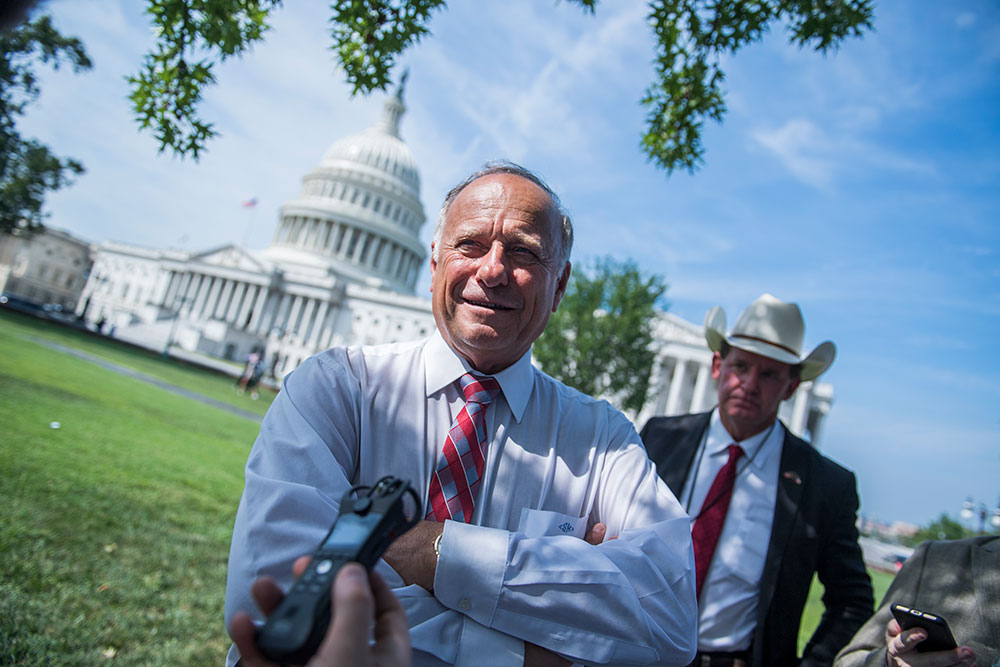
Rep. Steve King, R-Iowa, attends a rally with Angel Families on the East Front of the Capitol, to highlight crimes committed by illegal immigrants in the U.S., on September 7, 2018
Journalists, even those whose job it is to set standards, continue to have a hard time determining if the word “racism” applies in a story. Here’s a simple rule of thumb: Treat the word like you treat every other word. It’s a useful reminder because we’ve fallen into a kind of overthinking and overcorrection about perceived (and sometimes real) missteps by those who mis- or over-use the word.
That overthinking reached a new low recently when NBC News told its journalists to not refer to comments by Rep. Steve King as racist, even though King had defended white supremacy.
This is what King told The New York Times in an interview: “White nationalist, white supremacist, Western civilization—how did that language become offensive? Why did I sit in classes teaching me about the merits of our history and our civilization?”
According to Huffingtonpost.com, this is what NBC News originally told its staffers, before changing course after the internal guidance leaked and the news organization was heavily criticized: “Be careful to avoid characterizing [King’s] remarks as racist. It is ok to attribute to others as in ‘what many are calling racist’ or something like that.”
What should have been a layup for every other news outlet instead soiled NBC’s reputation. Defending white supremacy is racist. Period. But it’s as though the only acceptable reason to call King or his comments racist is if someone else called King racist first. It was an abdication and dereliction of NBC’s journalistic duty to speak truth. NBC was right to quickly reverse course, but it speaks volumes that they first twisted themselves into illogical knots on something that should have been an easy call.
I don’t see journalists struggle this way on any other issue. We are taught to use the right word, the precise word, not the almost right word—except when it comes to race.
That’s why we say nonsensical things, such as “racially charged” and “racially tinged.” Just this week, “Empire” actor Jussie Smollett was allegedly attacked by two masked men who reportedly told him “this is MAGA country” after hurling racist and homophobic epithets and putting a noose around his neck. In a tweet, Entertainment Weekly described it this way: “BREAKING: Jussie Smollett has been hospitalized in Chicago after possible homophobic and racially charged attack.”
They had no problem writing homophobic but balked at using racist.
In recent weeks, I’ve asked a few journalists whom I’ve seen use such terms what they mean, and not one could give a satisfying definition. The terms are too ill-defined to mean much of anything. Still, they felt compelled to use ‘racially charged’ and ‘racially tinged’ and the like because they believe “racist” is such a harsh label it can forever damage a person’s reputation.
The label “racist” seems to make them more uncomfortable than the reality that a U.S. representative openly defended white supremacy.
There are other layers to this as well. We know to place reported facts in proper and broader context, knowing if we don’t we would be unintentionally misleading our audience. King’s white supremacy comments were not the first time he said racist and disturbing things. Had there not been that history, at least there would have been some question about his intent. Anyone of us can flub a sentence and utter something that sounds worse than intended. That’s a slip-up and should be treated in our copy as such if the person involved has no history of saying or doing racist things.
Here are some other things to remember…
In some cases, race, or racism, is the primary factor and should be placed high in a story. In others, it may be one of many important factors and be placed lower. Sometimes, we feel obligated to make race the story or not include it. That’s a mistake.
When the issue of race is messy and murky—which it is most of the time—that messiness and murkiness should be reflected in our stories. That’s true of most stories about Trump voters, for instance.
That NBC memo about King’s remarks illustrates the thinking that has many media outlets wrongly believe they didn’t notice Trump voters before the 2016 election. They did. It’s just that journalists failed to include an examination of race in their empathetic stories about plant closings in rural areas. It’s a blind spot journalists have on a variety of beats, including politics, manufacturing, real estate, terrorism, education, and beyond.
Given America’s history, every journalist should be asking if race—or racism—plays a role in whatever issue they are investigating. Too few journalists ask that question, not wanting to inject race into a story and thereby end up ejecting race from stories where it colors decisions and outcomes in sometimes unspoken and unacknowledged ways.
Just as a person can lie and not forever be a liar, or steal and not forever be a thief, a person can say something racist and not forever be a racist. And even a non-racist person can say something racist, meaning the label would rightly apply to his words but not his life.
There can be a racist effect, real harm, even if the intent was non-racist. Legislators and judges have tried to acknowledge that complexity with laws and rulings that hinge on “disparate impact.” Journalists must commit to doing something similar.

